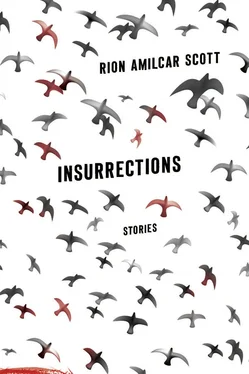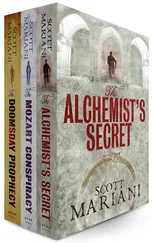We haven’t even paid the rent this month, my mother yelled. I got to go grocery shopping this week. Robert, you don’t think.
Why is everything such a big deal for you? I didn’t do anything wrong. I got the girl a nice gift.
You didn’t get that for her. You got it for yourself. When are you ever thinking about anybody but yourself?
We always pull through. You’re always predicting the worst and we always pull through. It’s never as bad as you say it is.
You don’t even know how we pull through.
Silence.
You want me to take it back? Fine, I’ll take it back.
It’s too late; you can’t take it back now. You already gave it to her like a fool. You’ll just be disappointing her. God, Robert, you apply for two jobs and then give up; got the nerve to spend the money I make on expensive gifts. I don’t understand you. It’s just like the garage. You never think anything through. All you had to do was apolo—
Could we not talk about that? I’m done talking about that.
Silence.
I don’t know how we’re going to get out of this one. We can’t live on that chessboard, Robert. Did you even try to think this through? I’ll tell you this, Robert, you’re not going to have Bobby out of school on his birthday so he can grow up to be like you.
Whatever—
You’re not a man, Robert. You don’t….
Think .
At least, I believe she said think , but I can’t be sure because the door slammed on that word.
A moment later my door cracked and a sliver of light expanded into the room.
Baby, I heard my father’s voice say. The gentle tinkling of wooden chess pieces bouncing against one another accompanied his voice. Baby, are you awake? Want to play chess with Daddy?
I pretended to be asleep. My bed shifted and creaked. My father sat on the edge by my feet. He said nothing for a while, sitting still. He sighed. He whispered something angrily. Before long he was taking short, tortured breaths and whimpering like an infant or a wounded horse. I cracked open my eyes and peered at him through slits. A glint of hallway light landed on half his face; the other half sat draped in darkness. A dampness slicked his cheeks. I burrowed my head between pillow and sheet and tightly shut my eyes.
Neither of us said anything about that night as the days passed. The marble chess set sat in the living room, our last game frozen on its face. Both my father and I barely acknowledged its presence most of the time. Every week, though, he removed the pieces, cleaned the dust from the board, and set them back just as we had left them that night.
One day it sparkled under the ugly yellow apartment lights while I sat across from it doubled over by an aching in my belly. My mother had cooked spicy wings for dinner; maybe that was the cause. I tried to ignore the pain by sitting on the scratchy brown couch and writing in my journal. As I wrote, I felt a new wetness between my legs. And there it was, a streak of brownish-red blood staining my underwear.
My mother knelt over the bathtub washing my underpants in warm soapy water, talking to me about babies and blood and all the ways my world would change. Most of it passed over me, disappearing into the universe.
A few days later I went to the park by myself, though my mother now forbid it and my father sided with her, saying, What are you looking at me for? You heard your mother. I slid into a seat across from Manny. He slowly took my pieces, finally checkmating me after the tall brown-skinned woman showed up. Manny walked off with her, leaving me with a dimpled smile and a wink as he had done before. I shrugged, sitting there by myself wondering if all that talk of my world changing was just another one of those empty things adults say to children.
My father barely spoke during this time. He usually disappeared after dinner, and I would hear him return late at night, taking heavy steps, loudly banging into furniture and cursing in pain. In the darkness I stared up at the ceiling, thinking about games I watched in the park or something else entirely. He would be gone again in the morning when I awoke for school. In the afternoon there was my father, sitting on the couch, red-eyed with a green bottle of beer in his hand.
The day we returned to the board was an unusual one. It must have been a school holiday, because my brother and I were both home, but my mother wasn’t there. I remember my father’s coarse hands gripping a folded newspaper to his face as I ate soggy cereal. His hands made me think of his loss in the park.
After I had cleared the table and washed the dishes, I spread the crumpled chess mat on the table next to the marble board. Without saying a word to my father, I set up the pieces, both black and white. My father put down the newspaper and approached the table cautiously. He suggested I be white and started to take a seat before the black pieces, but I shook my head and spun the mat so that the white pieces sat before him.
We stared at the evolving board, barely speaking, feeling for the fallen pieces almost as if they were dead family. My father made a mistake and grunted angrily. One of his bishops went down, and his king stood exposed.
Who taught you a move like that? my father asked. I was too deep in concentration to respond.
He made a helpless move and hid a crestfallen brow behind a false smile.
I imagined my father’s mind racing, cataloging everything that had ever tumbled down around him. I put my hand on a bishop, my would-be assassin, and thought of my father’s heights when he won, how he galloped around. The depths of his despair at losing, I expected, would be equal to the peaks. He’d mope about, his face fallen and miserable, his posture stooped as if his back ached. I took my hand from the piece and leaned back in deliberation. He ran his left hand over his cheek and his upper lip as a sort of nervous gesture.
My bishop moved to an out-of-the-way square where it died at the hands of one of my father’s pawns, and my father chastised me for missing an opportunity to take the game.
It’s not over, I said. That’s all part of the plan.
His tight jaw eased. His eyes danced with life, and his down-turned mouth became a straight line.
I inched a pawn forward, anticipating that moment when it would reach the other side and take the rank of queen. We went back and forth trading pieces. My queen fell. The pawn I had been grooming fell, and I inched another one forward a single square at a time. My father’s moves were now of little interest to me as I eyed that determined black pawn. If it became a queen, I could still pin his king in three or four moves. I watched his spare pieces as he studied the board. He angled them into position, maneuvering his bishop and a pawn to kill my king. Doubling back, I blocked him. He made another move, and I focused again on my pawn.
It danced to the last square, transforming into royalty, that most powerful lady of the board.
And as I smiled at the pawn’s triumph, my father used a knight and a rook to seal my king’s fate. He slapped his hands together and rocketed to his feet, announcing his checkmate with a shriek while he paraded around the table laughing and applauding. I gave the victor the slightest nod and tipped over my dead king.
The man walking toward me stretched his hand out as we crossed the street. I shook it and kept walking, as I had never seen him before.
Juba, he said. Boy, Juba, I ain’t seen you in a long time. Juba woo-wee.
Because my name is not Juba, I was content to keep moving. The man stopped right in the middle of busy Carroll Street, still gripping my hand. A money green Acura turned sharply in front of us. I dipped and jerked to avoid being struck.
Are you crazy? I asked as we made it to the sidewalk.
Читать дальше












